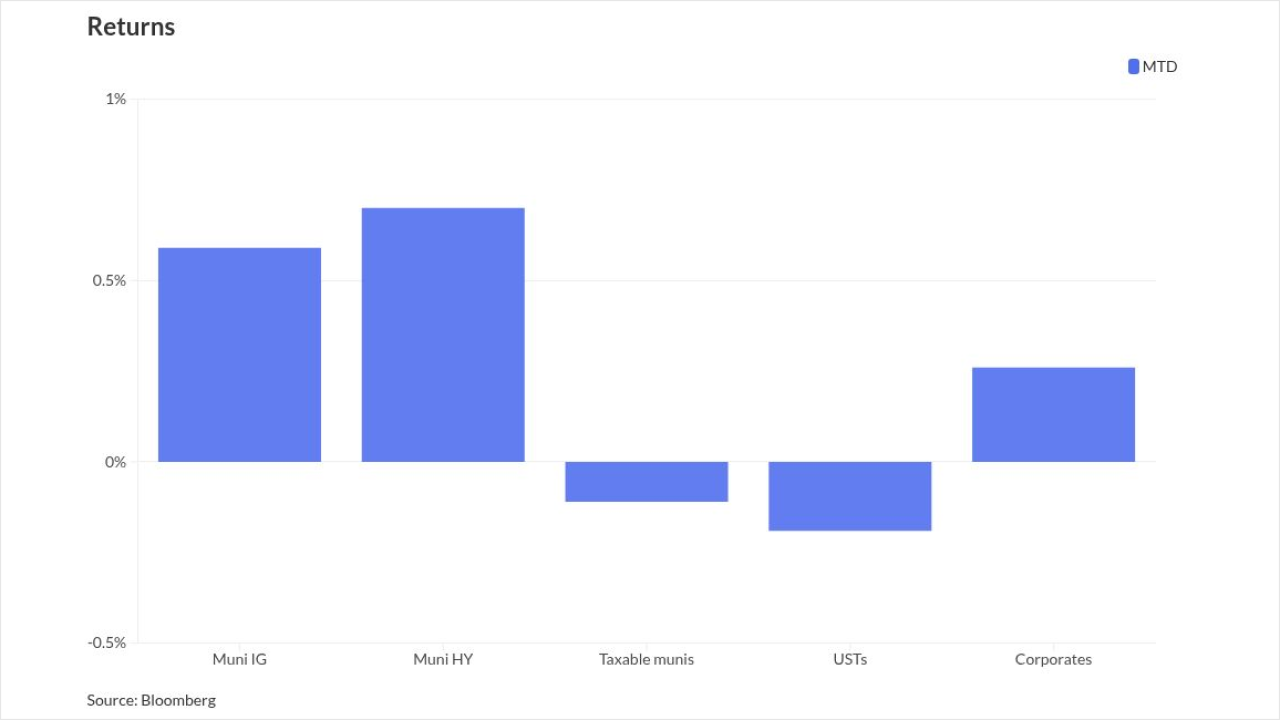
Chicago Mayor Brandon Johnson's proposed $16.6 billion 2026 budget would reduce the supplemental pension contributions that had lifted the city's credit stature.
The budget, released Thursday, calls for new revenues, but avoids the property tax hikes that fell flat with City Council last year.
"I think bond investors are always looking at the pension situation," said Howard Cure, partner and director of municipal bond research at Evercore Wealth Management. "It was bad when the state put through legislation
The advanced pension payments are above what is required by state law, but the contribution levels required under state law are part of the reason the city's pensions
New revenue sources proposed in the budget include an employee head tax, which the Johnson administration has labeled the "community safety surcharge," and new taxes on social media, online sports betting and hemp products.
It would declare the largest tax increment financing surplus in the city's history, and use short-term borrowing to fund police misconduct settlement payments and retroactive firefighter pay increases.
Johnson said his administration is "reducing the cost of administering government" without slashing services, through real estate consolidation, improved fleet management, streamlined administrative functions and special event cost recovery.
Rating agencies said they are waiting to see how the budget debate plays out in City Council, but signaled some concerns.
"Reducing the pension payment is credit negative because it results in contributions that are insufficient to curb growth in the reported unfunded liability," David Levett, vice president and senior credit officer at Moody's Ratings, said by email.
Moody's rates Chicago general obligation bonds Baa3 with a stable outlook after a
KBRA views the budget's one-time revenue sources less favorably than recurring revenues, said Linda Vanderperre, managing director at the rating agency.
Those one-time sources include roughly $500 million of proposed TIF surplus beyond the typical annual TIF surplus, a proposed bond refunding, the proceeds from the sale or lease of city-owned land, and borrowing for settlements.
On the flip side, she said, the employee head tax would be a credit positive.
"While the proposed $21 per month head tax on companies with over 100 employees may face opposition from the business community, we view the administration's efforts to identify potential solutions to the structural deficit favorably, including the formation in April of
On balance, the mayor's proposed budget would likely be credit neutral if passed in its current form, she said. KBRA rates Chicago GOs A-minus after
Municipal Market Analytics said in a Monday report that the mayor's budget may pressure the city's ratings.
"As a bellwether for credit spreads, investors will want to take note of budget-related widening; if that happens, more cheapening by other story credits could be imminent," MMA said. "The proposal does a good job articulating the administration's values… but falls short on sustainably financing them."
MMA pointed to the absence of an increase in property taxes "that would provide a stable, recurring revenue source."
Alderpeople have some questions about the mayor's budget, said Ward 32 Alderman Scott Waguespack.
"Definitely the credit impact is a concern," he said. That includes from the line of credit the Johnson administration wants to take out — a $100 million line of credit with an interest rate possibly upwards of 9%, he said.
The borrowing for police misconduct settlements is another concern.
"That's a step backward from what we had (done) in the past," Waguespack said. "(The) Emanuel and Lightfoot (administrations) took police misconduct settlements off the books… and they're going right back to that."
He also criticized the concept behind the new social media tax.
"The social media companies are challenging all of those (taxes)," he said, noting that such taxes have typically been struck down. "Even some of the liberal judges have said (it raises) a pretty serious First Amendment issue… It's not a slam dunk like they're saying."
If the tax is rejected by City Council or struck down by a court, it could leave a gaping hole in the budget, forcing the mayor to turn to a property tax hike as a potential gap closer, he said.
The social media tax is an interesting idea but is problematic for several reasons, said Justin Marlowe, research professor at the University of Chicago's Harris School of Public Policy and director of the Center for Municipal Finance.
"There's clearly a lot of movement in this direction in state and local tax policy toward taxing services, taxing digital assets, taxing digital services and so forth," he said. But "I think the mayor is probably three to five years too early on this."
Tax policy experts have also raised concerns about relocation incentives if digital services are taxed at the municipal level. It's better to tax those companies at the state or regional level, Marlowe said.
There are also
Marlowe said any settlement in that litigation could further undermine the case for local taxation, with social media companies likely to argue that they'd done their penance through the settlement.
The advance pension payments "have been a real credit positive for the city," Marlowe said, and noted that the administration's justification for no longer making the full payment raises concerns about the future.
The justification is essentially that the previous administration of Lori Lightfoot had put in place an assigned portion of the corporate fund balance that's now been exhausted, so the funding source for the advance pension payments is no longer there.
"To my knowledge, there was really no mention prior to any of this about how the advanced pension payment was contingent on there being resources in that assigned general fund balance," Marlowe said. "So now, not only is it that they're not making the payment, but they're signaling that they're likely to short the advanced payments in the future… The rating agencies will most certainly take notice of that."
On the short-term borrowing for settlements, Marlowe said speed is key: "The timing is a little bit more accommodating right now," he said. "I think if they have to wait six months or something to do it, that might be a different story."
One could make the case that a shorter duration, taxable GO would probably price pretty well these days, he added. If the administration borrowed on the city's credit, in the current market, "they're probably looking at something in the neighborhood (of) like, 5% yield for three-year money, or four-year money — which is high for sure, but not nearly as high as you might think," Marlowe said.
If the administration were to borrow on the sales tax securitization corporation credit, it would be looking at a more reasonable rate, he said. "Say they say they do $300 million level debt service, $100 million a year over three years, something like that; then you're looking at probably in the neighborhood of $30 to $40 million of debt service costs," Marlowe said.
That may seem like a lot, he said, but the Johnson administration can make the case that getting those liabilities off the books, and removing that element of uncertainty, is a positive step.
Still, without a policy framework for dealing with these misconduct payments in the future, there's the potential for more large liabilities that could appear at any moment.
"I'm not sure what they're doing to prevent that going forward," Evercore's Cure said of the misconduct borrowing. "They're not in a position to keep adding debt for things that are caused by the city itself."
Cure also raised concerns about the city's relationship with the Trump administration. "You can't have a discussion about a major city anymore without thinking about its relationship with the federal government," he said.
The full impact of Trump's tax and spending bill on things like education, health, SNAP, Head Start and transit remains to be seen, he said. Is the state going to force the city to shoulder those burdens, and is the president going to further target Chicago?
"What I'm watching also is what kind of cooperation the mayor's going to get from the City Council, because
He suggested that the fate of the advance pension funding policy will also be key to watch.
"You just don't want them to lose discipline on their pensions, because that's the biggest knock on the city. It's not the economy," he said. "You want to see them maintain some discipline in their budget. But that's going to require some tough negotiations with city employees."
S&P Global Ratings assigns Chicago a BBB rating with a stable outlook after a one-notch downgrade in January. Fitch Ratings rates the GO credit A-minus and
The STSC credit is rated A-plus by S&P and AAA by Fitch and KBRA.





